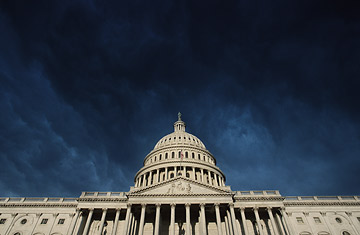
The US Capitol
Last November, most analysts agree it was voter dissatisfaction over congressional lobbying and ethics scandals, along with the Iraq War, that helped pave the way for the Democrats to take back the House and Senate. Many Democrats vowed to change Washington's "culture of corruption," the kind that sent former lobbyist Jack Abramoff and former California Rep. Randy "Duke" Cunningham to prison. Now, as public satisfaction polls with the legislative branch hit new lows and Congress prepares for the month-long August recess, Democrats hope to push through a reform package they refer to as the most sweeping ethics and lobbying legislation in generations.
But is it simply more of the same? A year after deriding a proposed Republican lobbying reform bill as toothless and cosmetic, the bill Democrats are poised to finally pass, with Republican support, is similar to the measure they opposed last year.
On Monday, Democrats unveiled a plan that would place tighter restrictions on gifts from and travel paid for by lobbyists; force the disclosure of "bundled" campaign contributions; require that the content and sponsors of earmarks be listed on the Internet 48 hours in advance of a bill vote; and ensure that neither lawmakers nor their families financially benefit from those earmarks. It's that provision focusing on earmarks — measures that lawmakers have typically quietly inserted into legislation at the last minute to allot money for pet projects in their home states — that has drawn the loudest criticism from two conservatives, Sen. Jim DeMint, a Republican from South Carolina, and Sen. Tom Coburn of Oklahoma, as well as House Minority Leader John Boehner, who have derided the measure as mostly ineffective.
"What they did was wash the outside of the cup, but the inside of the cup is still filthy," railed Coburn, who said the legislation would present the appearance of reform while still leaving open loopholes. "If you want to fix what's wrong in Congress, you have to make the earmarking process completely transparent. We had a great strong bill in January and they gutted it." That bill, which passed the Senate almost unanimously, had stalled after Sen. DeMint blocked a conference committee from meeting to discuss and reconcile the bill's House and Senate versions because of his concerns that the earmarking provisions would be watered down.
DeMint and Coburn are unhappy with a rule that would allow Senate Majority Leader Harry Reid, a Nevada Democrat, and his committee chairmen — rather than the bodys parliamentarian — to determine whether earmark disclosure rules have been complied with. It's a technical point, admits DeMint, but a key one. "One of the reasons Americans have such a low opinion of Congress is that we pretend to do things that we don't actually do, and here we are just pretending to pass real reform," he said. "The [majority] leader can just say that no new earmarks have been added and we'll find out later that they have. There's no teeth to this thing."
Which, of course, a cynic would say is precisely why passage of the measure looks likely, with the House overwhelmingly voting in favor on Tuesday and the Senate expected to push its portion through by week's end. "Our bill establishes workable rules for full earmark disclosure. Apparently a handful of Senators are desperate to slow down passage of the most comprehensive ethics reforms in American history," said Reid spokesman Jim Manley, who reiterated the Majority Leader's threat to cut into his members' precious recess time if the legislation is held up.
The "Honest Leadership and Open Government Act of 2007," is wide-ranging, covering situations both large and small in both houses of Congress. One section deals with the so-called "revolving door" and prevents former Senators from lobbying Congress for two years after they have left. (It maintains the current rule that former Representatives be prevented from lobbying the House for one year.) Another section prevents former members who become lobbyists from using Congress' parking and gym privileges. Yet another requires that congressional travel paid for by outside groups be posted on the Internet. One of the most significant measures forces lawmakers to report all lobbyist-bundled contributions that total more than $15,000 every six months. While it is an admittedly weaker standard than a former draft, which would have placed the threshold at a mere $5,000, it's more than the status quo, which presently does not require any bundling disclosure.
Fred Wertheimer, president of Democracy 21, a nonprofit group that focuses on campaign finance reform, characterized the bill as "landmark," despite some compromises. "With legislation there's never perfection, but this delivers on the commitment that was made by the Democratic leadership to respond in fundamental ways to the corruption scandals of the last Congress."
Or, perhaps, of this Congress. On Tuesday morning it was reported that FBI agents raided the home of Alaska Republican Senator Ted Stevens in conjunction with a public corruption investigation. In a statement, Stevens said the investigation should be allowed to continue until the whole truth is revealed and urged patience. That appears to be the very thing that congressional Democrats have run out of.
